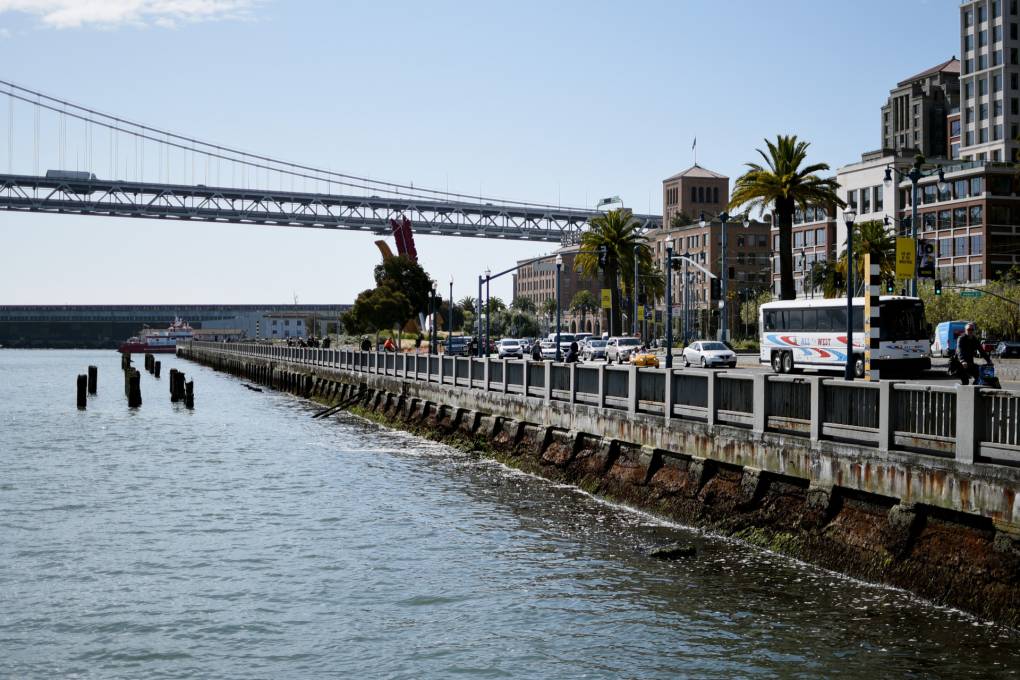San Francisco's Aging Infrastructure Ill-Prepared for Future Flooding, Report Warns
Bureaucracy is hindering San Francisco from adapting to worsening flood risk due to human-caused climate change, according to a new report from the San Francisco Civil Grand Jury. A report by the San Francisco Civil Grand Jury has warned that San Francisco's infrastructure is ill-prepared for future flooding due to human-caused climate change. The report found that the city lacks a comprehensive funding plan for adapting to climate change, siloed agency planning, and the city's debt policies prevent it from funding needed flooding projects. It also highlighted a lack of transparency about the city’s current adaptation efforts, leading to a more comprehensive and integrated plan for climate change adaptation. The jury recommended reforms in the decision-making process in its Climate Resilience Program, be transparent in planning for climate effects, reassessment funding shortfalls, and improved interdepartmental coordination to address flooding. The Public Utilities Commission has been warned that it needs to significantly update its stormwater infrastructure to handle future deluges.

Được phát hành : một năm trước qua Ezra David Romero trong Science
San Francisco’s bureaucracy is hindering it from adapting to worsening flood risk due to human-caused climate change, according to a new report from the San Francisco Civil Grand Jury. Surrounded by water on three sides, the city is in danger as seas rise and flooding worsens from more intense storms — projected to grow as much as 37% wetter by the end of the century — and the sewer system as it stands now is incapable of handling it, the grand jury also found. “The biggest finding we found was that this is a challenge that faces every department within the city,” said Michael Carboy, jury foreperson. The jury’s study found that San Francisco “lacks a comprehensive funding plan” for adapting to climate change, which is made worse by siloed agency planning. It also found that the city’s debt policies prevent it from funding needed flooding projects.
These issues are “aggravated by a lack of transparency” about the city’s current adaptation efforts, hindering climate resilience, the report said. “With at least 23,700 residents likely harmed by inland flooding, the city needs a more comprehensive and integrated plan to adapt to climate change,” Carboy said. The jury listed five main recommendations: for San Francisco to reform the decision-making process in its Climate Resilience Program, be transparent in how it plans for climate effects, reassess funding shortfalls required to respond to climate change, improve interdepartmental coordination needed to address flooding, and better inform the public about flood insurance options and the areas of the city that scientists expect to flood. The San Francisco Civil Grand Jury is a panel of 19 citizens who don’t work in government. They serve for a year to investigate and issue reports on significant local government actions or, as in this case, government lack of action. “The public needs to know what is being currently done to adapt to climate change, as they will be the taxpayers, ratepayers, and floodplain dwellers affected by the success of the city’s resilience efforts,” the jury wrote. Representatives of San Francisco’s Office of Resilience and Capital Planning acknowledged the importance of a cohesive citywide effort in planning for climate change.
“To meet our climate goals, climate resilience must be embedded into every department’s work,” officials said in a statement Tuesday. “While there’s still work to be done, San Francisco has been a nationwide leader on climate resilience, making strides on flood management.” The jury noted that in 2021, the mayor’s office created ClimateSF — an interdepartmental agency made up of the San Francisco Public Utilities Commission, the Port of San Francisco, the Planning Department, the San Francisco Environment Department, and the Office of Resilience and Capital Planning — to help the city adapt to flooding. However, the jury found, the agencies need more capacity for unexpected major capital projects that could address future flooding. The jury could not find a list of infrastructure projects devoted to climate change resilience or a line item in the capital budget showcasing investment, making it “difficult to determine how much the city is currently spending on climate change,” it said. The jury also found that future stormwater will exceed the capacity of the city’s storm and wastewater infrastructure. “Not only will our feet get wet from rising sea levels, but the city is on a hill, so we are going to get a double whammy from extreme precipitation and rising groundwater,” Carboy said. The Public Utilities Commission released a study last July finding that the agency needs to dramatically update its stormwater infrastructure to handle future deluges. The agency did not respond to a request for comment Tuesday. Lastly, the jurors found that the city is paying out flood damage claims for “inadequate wastewater drainage” because flood insurance is only required for structures in particular flood hazard areas. The jury recommended that the city better communicate with homeowners and business owners about obtaining flood protection. Eric Young, communications director for the Port of San Francisco, said the agency is reviewing the report and “looks forward to coordinating” with other city agencies in responding to the jury’s findings. The port is also working with the U.S. Army Corps of Engineers on a plan to adapt 7.5 miles of the shore to defend against future sea level rise. This could include raising the Ferry Building seven feet, some managed retreat and even re-envisioning the entire Embarcadero.
